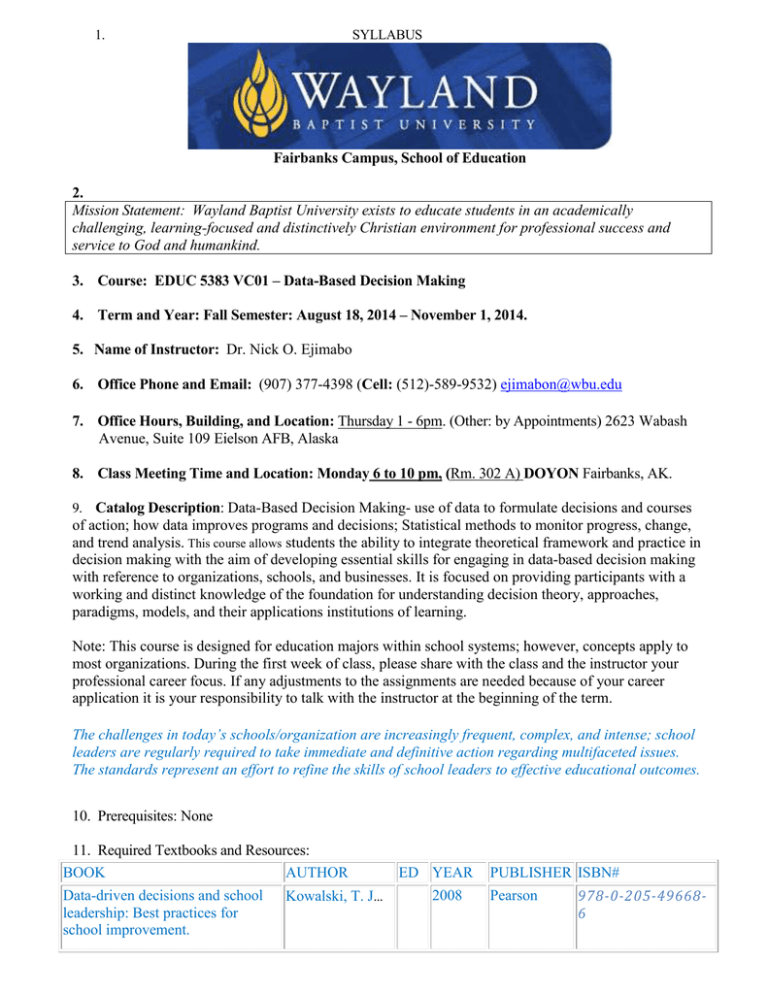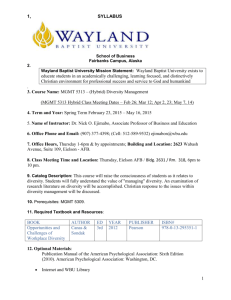Fairbanks Campus, School of Education 2.
advertisement

1. SYLLABUS Fairbanks Campus, School of Education 2. Mission Statement: Wayland Baptist University exists to educate students in an academically challenging, learning-focused and distinctively Christian environment for professional success and service to God and humankind. 3. Course: EDUC 5383 VC01 – Data-Based Decision Making 4. Term and Year: Fall Semester: August 18, 2014 – November 1, 2014. 5. Name of Instructor: Dr. Nick O. Ejimabo 6. Office Phone and Email: (907) 377-4398 (Cell: (512)-589-9532) ejimabon@wbu.edu 7. Office Hours, Building, and Location: Thursday 1 - 6pm. (Other: by Appointments) 2623 Wabash Avenue, Suite 109 Eielson AFB, Alaska 8. Class Meeting Time and Location: Monday 6 to 10 pm, (Rm. 302 A) DOYON Fairbanks, AK. 9. Catalog Description: Data-Based Decision Making- use of data to formulate decisions and courses of action; how data improves programs and decisions; Statistical methods to monitor progress, change, and trend analysis. This course allows students the ability to integrate theoretical framework and practice in decision making with the aim of developing essential skills for engaging in data-based decision making with reference to organizations, schools, and businesses. It is focused on providing participants with a working and distinct knowledge of the foundation for understanding decision theory, approaches, paradigms, models, and their applications institutions of learning. Note: This course is designed for education majors within school systems; however, concepts apply to most organizations. During the first week of class, please share with the class and the instructor your professional career focus. If any adjustments to the assignments are needed because of your career application it is your responsibility to talk with the instructor at the beginning of the term. The challenges in today’s schools/organization are increasingly frequent, complex, and intense; school leaders are regularly required to take immediate and definitive action regarding multifaceted issues. The standards represent an effort to refine the skills of school leaders to effective educational outcomes. 10. Prerequisites: None 11. Required Textbooks and Resources: BOOK AUTHOR Data-driven decisions and school leadership: Best practices for school improvement. Kowalski, T. J… ED YEAR 2008 PUBLISHER ISBN# Pearson 978-0-205-496686 A. Student Textbook:., et al. (2008). Boston: Pearson. This text is required. (ISBN:) 12. Optional Materials: A: Access to WBU Learning Resources www.wbu.edu/lrc B: Internet and Library • C: ISLLC – www.ccsso.org/content/pdfs/isllcstd.pdf D: State Department of Education websites - Arizona, Texas, Alaska, etc. 13. Course Outcome Competencies: Upon completion of this course the student should be able to: 1. The student will demonstrate knowledge of statistical inquiry by analyzing sample assessments and comparing the results with the standard or goal being investigated. 2. The student will demonstrate professional presentation skills by preparing documents or presentations outlining the findings the analysis. 3. The student will perform appropriate statistical procedures to the data sets provided. 4. Be able to apply data-based decisions to problems commonly occurring in schools. 5. Design processes that are streamlined, effective, efficient, and flexible 6. Identify the right people to work within the right structure in order to accomplish tasks of the organization 7. Use the correct data in decision making Co MEANS FOR ASSESSING STUDENT ACHIEVEMENT OF THE OUTCOME COMPETENCIES: Discussion Board (weekly) Reading Assignments Analysis of Local Practices Research Paper Completion of a Final Exam. 14. Attendance Requirements: As stated in the Wayland Catalog, students enrolled at one of the University’s external campuses should make every effort to attend all class meetings. All absences must be explained to the instructor, who will then determine whether the omitted work may be made up. When a student reaches that number of absences considered by the instructor to be excessive, the instructor will so advise the student and file an unsatisfactory progress report with the campus executive director. Any student who misses 25 percent or more of the regularly scheduled class meetings will receive a grade of F in the course. Additional attendance policies for each course, as defined by the instructor in the course syllabus, are considered a part of the University’s attendance policy. Additional Attendance requirement: Excessive late arrivals or early departures will be taken into consideration. Material will be discussed in class and included in the exams that are not in the book. It is the student’s responsibility to obtain any material missed by not attending class for any reason. The student must not miss any more than 25% of the class. Any more misses may result in failure of the class. In case of TDY’s the instructor should be notified as soon as possible. 15. Disability Statement: “In compliance with the Americans with Disabilities Act of 1990 (ADA), it is the policy of Wayland Baptist University that no otherwise qualified person with a disability be excluded from participation in, be denied the benefits of, or be subject to discrimination under any educational program or activity in the university. The Coordinator of Counseling Services serves as the coordinator of students with a disability and should be contacted concerning accommodation requests at (806) 291- 3765. Documentation of a disability must accompany any request for accommodations.” 16: Course Requirements and Grading Criteria: Assignments and Points a. Reflection paper: Students will prepare reflective summaries and create a collection of materials to utilize in future endeavors in education. The will be two reflective papers in this semester. Each student will be assigned /select a special topic from the subject matter of our course. The instructions and the due dates for reflection papers will be posted on the blackboard under the course content as an assignment. Total value = 100 points (50 points for each) . b. Research Paper- Each student will write a research paper of at least 6 pages (body; does not include cover page, bibliography, etc.) and no more than 15 pages. It should be APA style. The paper will be an argument either supporting or opposing the use of school vouchers. The primary content of the paper should be based on actual school data you’ve collected from available sources. This can be data for an individual school, schools in a particular district, schools in a particular city or county, or general data for schools across the state.. c. Examination: A final examination will be given on Blackboard covering basic terminology, definitions, and meanings of common terms used in research and data analysis. The terms found on the exam will come from the textbook and from everyday usage in school and leadership settings related to data-based decision making. This will be an open-book exam and it will not require a local proctor. Total point value of 200 points d. Analysis of Local Practices- Each student will do an analysis of a local (your employer or area of responsibility) practices in data-based decision making. This analysis should be prepared for presentation by incorporating it into a professional Microsoft Power Point presentation. This presentation should equate in length to a ten to fifteen-minute presentation. e. Attendance Class Discussion, Activities, and Participation You are expected to attend, participate and respond to the discussions and questions in every class. It involves answering of questions, personal experience, and suggestion on what you think about the class discussions and topics. Class participation is a grade activity that reflects preparedness for class as well as attendance. Arrive on time with assigned reading and papers completed on the prearranged deadline. Total point value of 150 points. Grading Rubrics Reflection Paper 100 Analysis of Local Practice Research Paper Final Exam Attendance/Participations Board Total Grading Scale: A = 90 - 100% B = 80 - 89% C = 70 - 79% D = 60 - 69% F = below 60% I = For Incomplete W = For Withdrawal 300 300 200 100 1000 Note: Students are required to demonstrate proficiency in the requirements covered in this Syllabus and in class. Students who are underperforming or who believe they need additional help are to inform the instructor or dean immediately. 17. Tentative Schedule: (Calendar, Topics, Assignments) This course outline serves merely as the anticipated roadmap I hope to use during this 11 weeks program. However, due to circumstances and the dynamic nature of this course, there may be some changes in the schedule. During such situations, you will be advised and changes will be discussed and noted accordingly. The dates and weeks listed below are the dates by which the course materials are expected to have been read. COURSE CALENDAR EDUC 5383 – TENTATIVE SCHEDULE ASSIGNMENTS - All assignments are due by midnight Sunday night to accommodate those who must complete the work during the weekend. ***I reserve the right to amend the schedule as needed. SESSION DATE CONTENT 1 Aug. 18 2 Aug. 25 3 Sept. 1 Problem Solving and Read Syllabus Decision Making in the Read Chapters 1-2 Context of School Reform and Decision Making Behaviors Decision Complexity, Models, Read Chapters 3-4 and Action Theory; Group Decision Making Understanding Data-Driven Read Chapter 5 Decision Making 4 Sept. 8 5 Sept. 15 6 Sept. 22 Technology and Read Chapter 8 Information Management Reflection Paper # 2 due 7 Sept. 29 Curriculum and Instruction Read Chapter 9 Online Activities 8 Oct.6 Effective School Improvement Read Chapter 10 Research Paper due 9 Oct. 13 Implementing and Monitoring Decisions Read Chapter 11 No Reading Assignment Research to Drive Education Decision Making Collecting and Assessing Data 10 Oct. 20 Final Exam 11 Oct. 27 Evaluation READING Assignments Introduction and course overview. Topic selections Read Chapter 6 Reflection Paper #1 due Online Activity Local Analysis Project Read Chapter 7 Data collection/Field work Research paper due Final Exam Final Presentations 18. Additional information as desired by the faculty member. Student Responsibilities: Students are responsible for reading, understanding, and obeying all academic policies appearing in the Wayland Baptist University Academic Catalog applicable to their curriculum and/or program of study. Changes in the Syllabus: Although this course is expected to follow the syllabus as written, the instructor reserves the right to adjust the syllabus. The instructor will inform the students of all major changes in a reasonable and timely manner. Division of Business Goals: The division of business is committed to producing graduates who have the knowledge and skills to excel in business in its various sub disciplines. We are also committed to instruction in the business disciplines that is invested with the values of Christianity. Plagiarism Policy: Intellectual integrity and truthfulness are fundamental to scholarship. Scholars, whether they are performing as students or as teachers, are engaged in a search for truth. Plagiarism is a form of cheating and also a form of theft. Plagiarism occurs when a student fails to give proper credit when information is either quoted or paraphrased. Carelessness is no excuse. As such, it is a breach of scholarly responsibility. It is also unethical and in some cases, illegal. Looking at or copying someone else’s test, answer sheet, and/or paper are counted as cheating. Plagiarism will result in an “F” in the course. 19. Note: All assignments will have due dates and late penalties. Failure to submit assignments on time will result in the reduction of your grade by 10 points per 24-hour period following the due date. 20. ADDITIONAL COURSE REQUIREMENTS: Readings: Assigned readings are to be completed prior to the class session for which they are assigned. CLASSROOM COURTESY: Exhibit courtesy to everyone in your class by being on time and staying for the entire class time. Turn cell phones off and do not use them during class. Use cell phone outside of the classroom during breaks. Limit your discussions to course content. 21. Format of Course Deliverables: All course assignments must be submitted in the class. All course deliverables must be constructed in Times New Roman, 12pt font, double space, and submitted in APA and Microsoft word.







